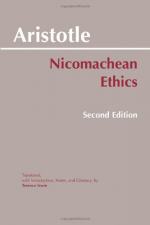
|
| Name: _________________________ | Period: ___________________ |
This test consists of 5 multiple choice questions, 5 short answer questions, and 10 short essay questions.
Multiple Choice Questions
1. How many sorts of political justice are there by the count of Aristotle?
(a) Six.
(b) Three.
(c) Four.
(d) Two.
2. By what means, according to Aristotle in V.5, does a community or a city stay together?
(a) Slavery.
(b) Exchange.
(c) Housebuilding.
(d) Religion.
3. About what does man deliberate, according to Aristotle in III.3?
(a) Things related to the means.
(b) Things related to the self.
(c) Things related to the end.
(d) The ends themselves.
4. Which of the following is NOT characteristic of Aristotle's magnanimous man?
(a) Lack of wonderment.
(b) A deep voice.
(c) Slowness of movement.
(d) Anxiety.
5. How many virtues does magnanimity require, for Aristotle, in order to be in a person?
(a) None of them.
(b) Three of them.
(c) All of them.
(d) Most of them.
Short Answer Questions
1. How many conditions does Aristotle list as necessary for an act to be performed virtuously?
2. Which of the following does Aristotle not list as a feeling that comes to be present in the soul?
3. Which sort of political justice is most universal in Aristotle's view?
4. How does Aristotle say the lawmakers ought to treat people who act beautifully?
5. Aristotle says that the magnanimous man cares more for what than for people's opinions?
Short Essay Questions
1. What does Aristotle mean by saying that a virtue is an active condition or state of the soul?
2. What is the significance of the quasi-virtues mentioned by Aristotle in the last part of II.7?
3. The magnanimous man is concerned with what things and in what manner, according to Aristotle?
4. What is Aristotle's distinction between the sort of injustice that is unlawful and the sort of injustice that is inequitable?
5. To which of the vicious extremes is the truthful man closer in disposition and why, according to Aristotle?
6. According to Aristotle, in what way is justice reciprocal, and why?
7. What characterizes Aristotle's notion of the generous person?
8. What is the distinction Aristotle makes between magnificence and generosity?
9. In the view of Aristotle, what is the opinion of the temperate person towards the pleasures in which the intemperate indulge?
10. What is the content of the suggestion of Aristotle regarding overcompensation and the acquisition of personal virtue?
|
This section contains 910 words (approx. 4 pages at 300 words per page) |

|




